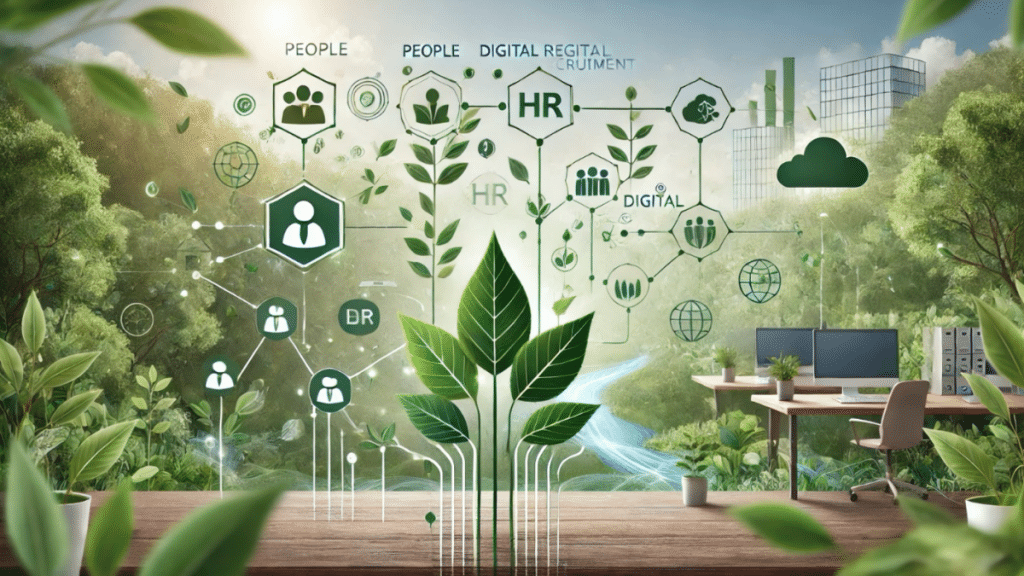Introduction
As businesses pivot towards sustainable practices, HR departments play a critical role in aligning workforce management with environmental, social, and governance (ESG) goals. Sustainable HR integrates responsible practices, prioritizing long-term social and environmental well-being alongside employee satisfaction. HR Technology Consulting and HRIS Integration (Human Resource Information Systems) enable organizations to modernize their HR functions, embedding sustainability into the talent management process to achieve a greener future. Companies like Unilever, Microsoft, and Patagonia have made notable progress by incorporating sustainable HR practices, showing how transformative this approach can be when guided by strategic HR technology consulting.
1. Understanding Sustainable HR and Its Role in Modern Organizations
Sustainable HR extends beyond conventional HR functions by addressing critical areas:
- Employee well-being: Prioritizing mental health, work-life balance, and job satisfaction to foster a resilient workforce.
- Diversity and inclusion: Establishing an inclusive environment to promote equality and equity in the workplace.
- Environmental responsibility: Enforcing paperless practices, promoting remote work, and adopting digital tools to reduce carbon emissions.
These pillars establish the foundation for sustainable HR, supported by technology consulting to make the transition seamless and impactful. In this context, HR Technology Consulting enhances talent management with eco-conscious practices, data-driven insights, and streamlined operations.
2. How HR Technology Consulting Enhances Sustainable Talent Management
HR Technology Consulting introduces tools and methodologies that align HR operations with ESG principles, making talent management more eco-friendly and efficient.
- Data-driven insights for eco-friendly decision-making: Consultants help companies adopt HRIS that track and analyze data on environmental impact, employee engagement, and resource use, enabling data-informed decisions that support sustainability.
- Remote and hybrid work models: Sustainable HR favors remote work to reduce commuting emissions, and technology consulting assists organizations in implementing remote work tools and digital collaboration platforms that make location-independent work feasible.
- Automation and paperless operations: Through HRIS integration, consulting firms enable automated workflows, digitized document handling, and streamlined recruitment processes, minimizing the need for physical resources.
3. Key Technology Solutions in Sustainable HR Consulting
- Green Recruitment Platforms
Leveraging platforms like Greenhouse and LinkedIn Talent Hub, HR technology consulting helps companies digitize recruitment, using AI-powered applicant tracking systems, remote interview tools, and online onboarding, significantly reducing paper and travel needs. - Employee Engagement and Retention Tools
Sustainable HR requires a focus on long-term employee well-being. Consultants implement AI-driven platforms like Workday and Qualtrics for personalized employee engagement, burnout detection, and wellness initiatives. These tools enable preemptive actions that sustain both employee satisfaction and eco-friendly workforce management. - Cloud-based HR Systems (HRIS Integration)
Cloud-based HRIS, such as SAP SuccessFactors and BambooHR, reduce reliance on energy-heavy on-premises systems. These systems provide comprehensive employee data, enabling consultants to develop optimized talent strategies and reduce environmental footprints. - Learning and Development (L&D) Platforms
Virtual learning solutions like Udemy for Business and Coursera facilitate employee skill development without requiring physical materials or travel. HR consultants help integrate these L&D platforms, fostering a sustainable learning culture aligned with green initiatives.
4. Reimagining Talent Management with Sustainability-Driven HR Strategies
Through sustainable HR practices, companies can redesign the entire employee lifecycle to be eco-conscious.
- Eco-friendly Recruitment: Green recruitment involves digital job fairs, remote interviews, and virtual onboarding, which reduce emissions and attract environmentally-conscious candidates.
- Sustainable Performance Management: HR technology consulting supports companies in adopting performance systems that prioritize long-term objectives and employee growth, using data analytics for sustainable, goal-driven evaluations.
- Diversity and Inclusion (D&I) Initiatives: With advanced metrics and AI-powered D&I tools, consultants aid organizations in fostering a diverse and inclusive environment, which sustainable HR views as essential for building resilient teams.
5. Benefits of Sustainable HR Transformation Through Technology Consulting
Implementing sustainable HR practices with the help of HR Technology Consulting delivers substantial advantages:
- Enhanced Employer Brand: Companies like Patagonia and Unilever, which emphasize eco-friendly practices, attract talent that values sustainability, improving recruitment outcomes.
- Cost Reduction: Sustainable HR initiatives reduce costs by cutting down on travel, paper use, and energy consumption through cloud solutions, remote work policies, and automated workflows.
- Regulatory Compliance: HR technology consulting helps companies comply with environmental and social regulations, ensuring they meet industry and governmental ESG standards.
- Increased Employee Engagement: Companies like Microsoft have boosted engagement with sustainability initiatives like remote work policies and wellness programs, fostering higher job satisfaction and lower turnover rates.
6. Real-World Case Studies: How HR Technology Consulting Drives Sustainable HR
- Unilever’s Green HR Transformation: Through partnerships with technology consulting firms, Unilever implemented cloud-based HR systems, cutting down on energy consumption and enabling remote work. This transformation helped Unilever align with its ambitious sustainability targets, demonstrating how HRIS integration supports both HR and ESG goals.
- Patagonia’s Digital Workforce Strategy: Known for its eco-conscious practices, Patagonia invested in HR technology consulting to integrate digital recruitment and engagement tools. These platforms allowed Patagonia to conduct remote interviews and digital onboarding, reducing travel emissions and paper usage while bolstering their sustainable brand image.
- Microsoft’s Sustainable Hybrid Model: Microsoft worked with HR technology consultants to implement robust virtual collaboration tools and AI-driven engagement platforms, supporting a hybrid work environment. The company’s remote work policy helped cut down on commuting emissions, and their HRIS integration allowed real-time tracking of engagement metrics, aligning with Microsoft’s carbon reduction objectives.
Conclusion
Sustainable HR is vital for companies aiming to achieve ESG goals and long-term success. With the support of HR Technology Consulting and HRIS Integration, businesses can seamlessly embed sustainability into their talent management processes, from recruitment to retention. As companies like Unilever, Patagonia, and Microsoft have shown, adopting sustainable HR practices enables organizations to strengthen their employer brand, reduce costs, and support eco-conscious workforce strategies. In a world increasingly focused on environmental responsibility, embracing sustainable HR with technology consulting positions businesses as frontrunners in the green transformation of workforce management.
